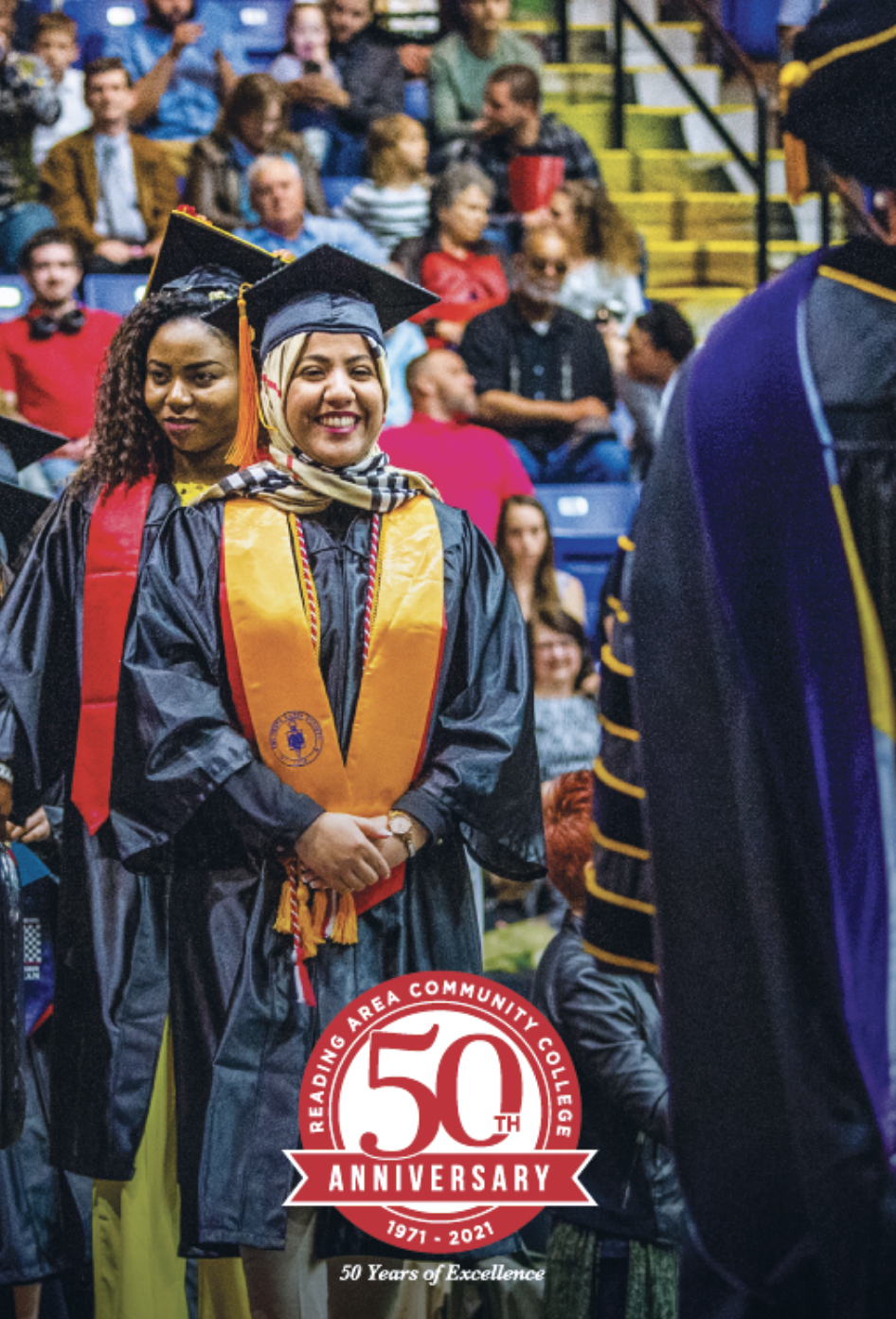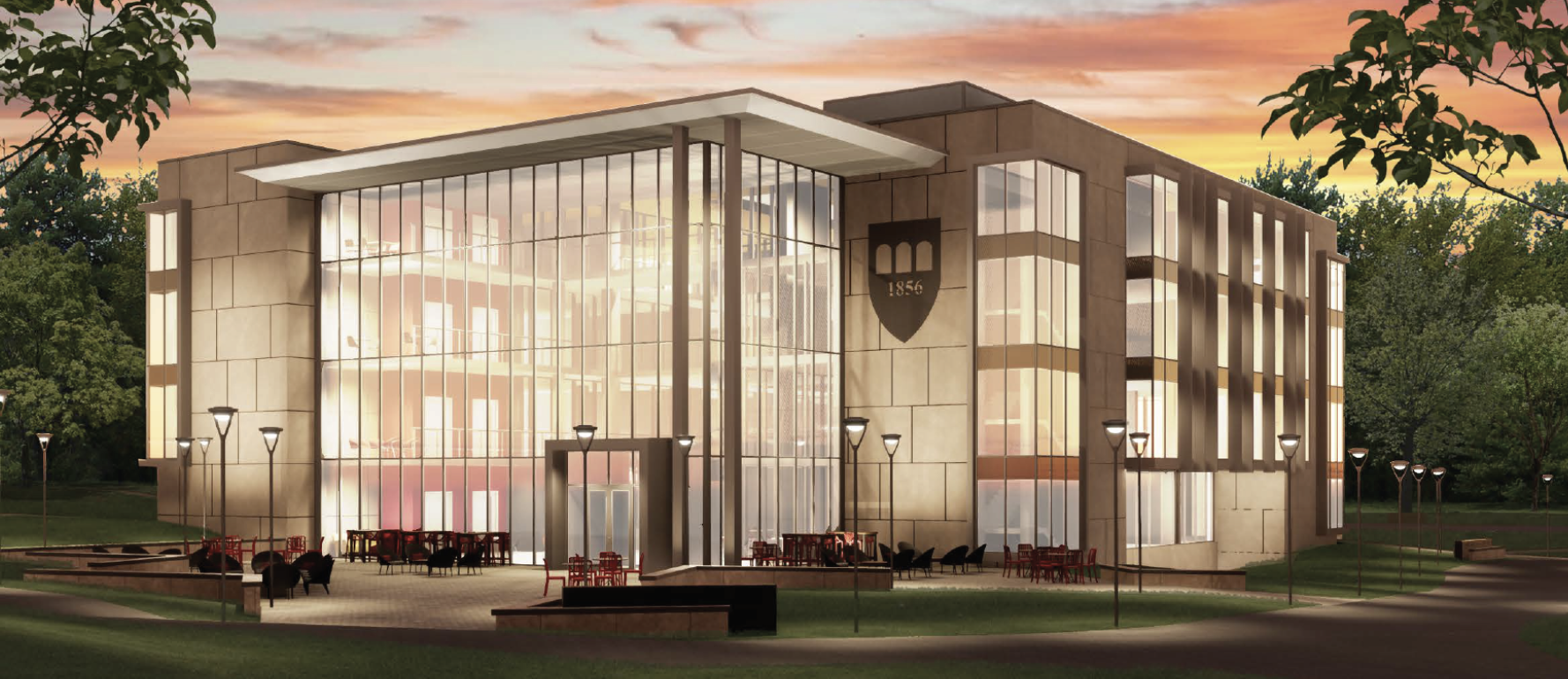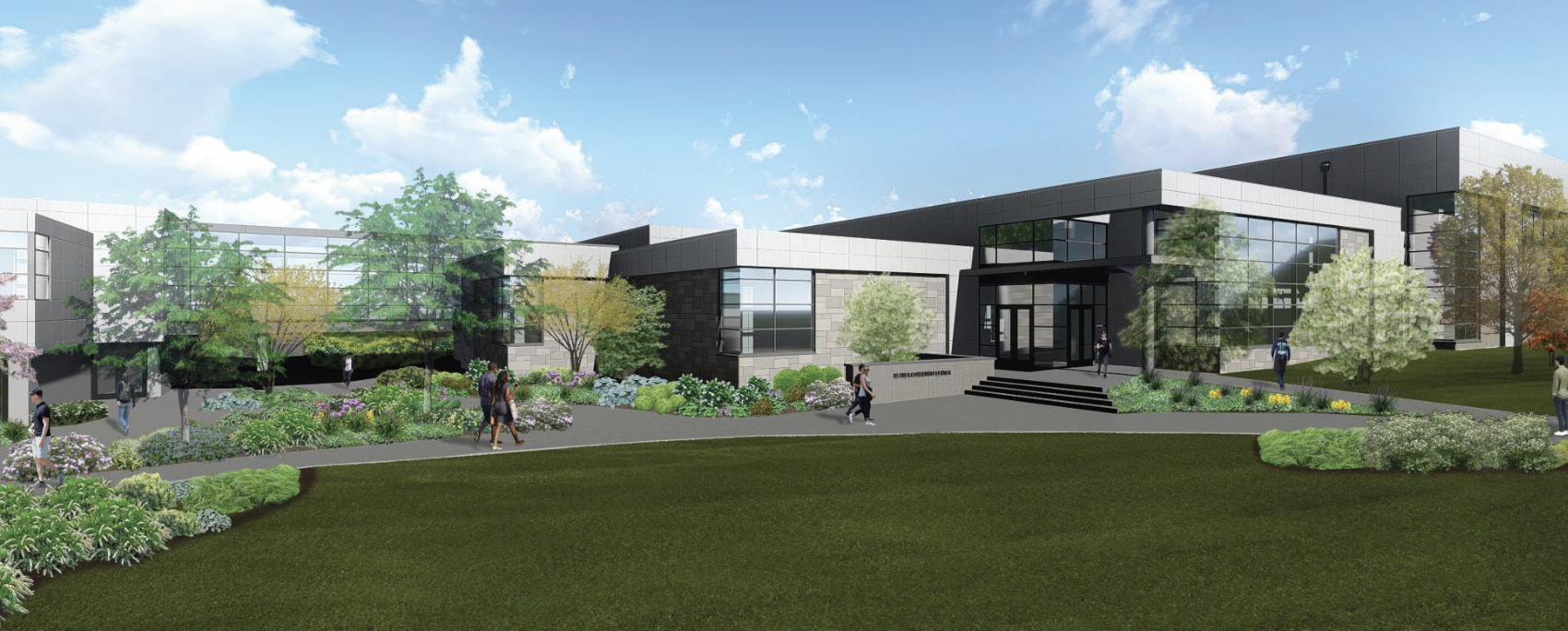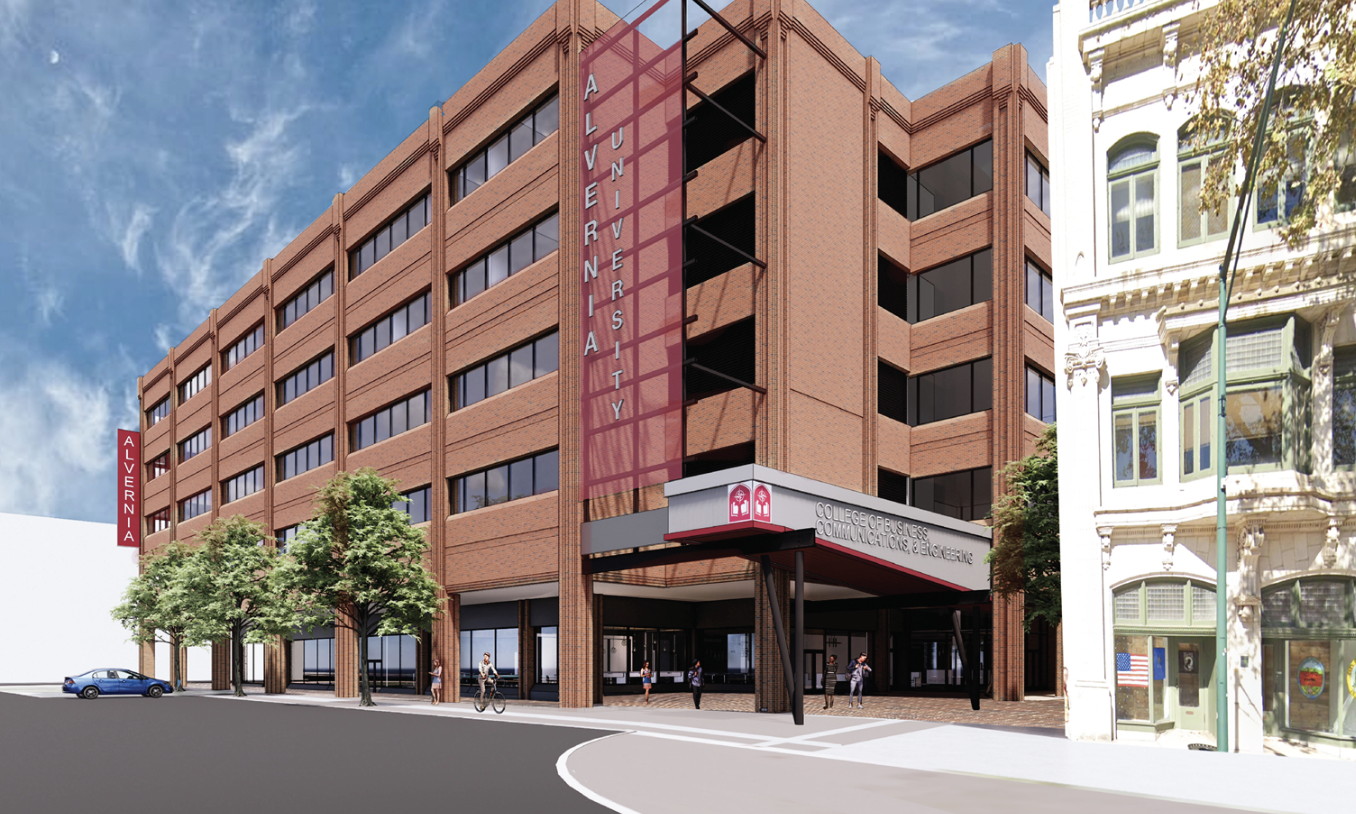
RACC Celebrates 50th Anniversary
Fifty years ago, Reading Area Community College (RACC) was founded on Oct. 1, 1971. Classes were held for the first time on Oct, 13, 1971, with an enrollment of 265 students. The college operated from several buildings throughout Reading during its early years until it acquired the Holiday Inn (the current Berks Hall building) in 1978. In 1996, the college completed a campus expansion plan that transformed it into an attractive city-based campus.
Now, 50 years later, RACC has graduated 13,771 students and has awarded 14,516 degrees, including associate’s degrees, certificates and diplomas. Training programs include career-focused training, transitional coursework, skills training for business and industry, personal enrichment programs and public service activities.
Students from every age, race, religion and many different countries throughout the world have chosen to study at Reading Area Community College. Those who are seeking degrees are attracted to programs like nursing, respiratory care, criminal justice and business. Others pursue certification in a variety of subjects. The Community Education/Workforce Development Division offers programs like dental assisting, home health aide, veterinary assisting, lab technician and GED preparation.
The college has had a deep impact in the business community as well. Founded in 2006, the Schmidt Training and Technology Center on the RACC campus provides training in senior leadership, manufacturing technology, information technology, workplace readiness and workplace literacy. RACC also collaborates with other community organizations to enhance the economic vitality of the city and county.
As we look forward to many more years, RACC remains committed to our four, key “hallmarks,” which we believe are at the core of a comprehensive community college: access, opportunity, excellence, and especially, hope.
Our mission ultimately offers hope to all persons, and we will continue to work diligently to sustain, and ultimately fulfill, that hope for all students.

Building Albright's Future
Two key structural projects underway at Albright College are designed to connect all of the different ways that students learn in the 21st century.
Student Success Commons and Library
Albright’s library is more than a quiet academic center on campus. Mindful of the college’s goal to support the success of every student, the library will become a hub of activity with emergent technologies and new ways of learning, teaching, studying and researching.
“Our vision is to create an academic center designed to foster a vibrant intellectual, cultural and social life for all members of our community — students, faculty, staff, alumni and residents of Berks County and surrounding communities,” says Karen Campbell, provost, senior vice president for Academic Affairs, dean of the faculty and P. Kenneth Nase M.D. ‘55, chair of Biology.
Highlights include built-in technology and tools for digital scholarship, as well as a central location for people and programs that help students succeed, such as the Academic Learning Center, Experiential Learning and Career Development Center, the Writing Center, tutoring, study spaces, academic coaching and accessibility services.
A new History and Cultural Center will house the college’s special archive collections, including the Nolan local history collection, the Lakin Holocaust Resource Center and artifacts from the Central Pennsylvania African American Museum.
“Having a welcoming, inclusive academic center that supports emergent technologies along with the many different ways in which our students learn, study, research and engage is critical to the academic success of our students,” says Campbell. “The Student Success Commons and Library will bring all of these resources together in an easily accessible, centralized space to support the academic success of all Albright students.”
Leo Camp Building
Located at 1801 N. 12th St., the Leo Camp Building is a shared space that houses Albright operations and a spacious manufacturing facility. Twenty-five thousand square feet of open space within the building is earmarked to become the new home of Albright’s Science Research Institute (SRI) – an elite program for K-12 grade students to create self-directed research projects in biomedical, genetic, environmental, agricultural, biotechnology and materials sciences. Students can also explore dance, art, music, the humanities, culinary arts and fashion through SRI projects.
“SRI is one of the most exciting projects driving the reinvention of Berks County as a hub of innovation and creativity,” says Kevin Murphy, president and CEO of the Berks County Community Foundation. “Making the Camp Building into a home worthy of that effort will accelerate our progress and allow us to expand the number of students who can participate.”
The renovation will include state-of-the-art science and technology laboratory and research spaces designed to create an environment that encourages innovation, complemented by access to research-grade equipment, exposure to cutting-edge technology and introductions to modern sciences by skilled mentors.
“As the oldest college in Reading, Albright College’s longstanding commitment to science and workforce development continues today,” says Campbell. “We are committed to educating students of academic promise and to enhancing Reading’s reputation as an innovation center.”

New Center at Penn State Berks
Penn State Berks Opens Beaver Athletics and Wellness Center
Penn State Berks is renovating and expanding one of its main campus facilities to meet the needs of students and faculty and to support the college’s NCAA Division III athletic program. The new Beaver Athletics and Wellness Center (formerly the Beaver Community Center) will be partially complete in time for the fall 2021 semester and fully complete in early 2022.
The expanded and renovated Beaver Athletics and Wellness Center will encompass 76,800 square feet. The project will enhance teaching, learning and co-curricular space on campus to support current and future academic programs. This project will have significant impact in three main areas: academics, athletics and recreation and wellness.
Both teaching and research in kinesiology, one of the college’s most popular degree programs, will be supported by two new flexible-use classrooms, an exercise physiology lab, a biomechanics lab and faculty offices.
The new facility will support the campus’s membership in NCAA Division III competition in 12 sports, including men’s and women’s basketball and women’s volleyball, which compete in the center. For these teams, as well as a host of intramural and club sports, the expanded Beaver Athletics and Wellness Center will provide a stronger foundation for student-athletes’ competitive success. Athletic programs will benefit from a new athletic trainers’ room complete with a state-of-the-art treatment and rehabilitation space, a hydrotherapy room, additional locker rooms and coaches’ offices.
The broader student body will enjoy a much larger and better-equipped fitness center and an auxiliary gymnasium that will increase accessibility for intramural and club teams and other students.
Building onto the existing structure, the project modernizes and reorganizes the interior spaces. A second floor will be added with an enclosed walkway connecting it to the Perkins Student Center. This walkway addition will include new rooms and a convenience store.
The original Beaver Community Center opened its doors in 1980. It is named for the late Howard O. “Mike” Beaver, Jr., who graduated from Penn State with a baccalaureate degree in metallurgy and went on to serve as president and CEO of Carpenter Technology. Beaver chaired the Berks Campus Capital Campaign, which raised funds for the construction of the original center. He served 12 years on the Penn State Board of Trustees and was named a trustee emeritus in 1992. Beaver passed away in 2008.
Atkin Olshin Schade Architects, with offices in Philadelphia and Santa Fe, NM, is the lead architectural firm. They are partnering with Hastings & Chivetta Architects of St. Louis, MO, on the project.
The expanded and renovated Beaver Athletics and Wellness Center is estimated to cost $30.4 million. In addition to the $23.3 million from Penn State’s capital plan funds, the Berks student body has committed $5 million from its Student Initiated Fee toward the project. The balance will be funded by Housing and Food Services, the University Access Committee and philanthropic dollars.

Kutztown Learning In-person Once Again
By Kutztown University President, Dr. Kenneth S. Hawkinson
It is said that “God throws us into deep waters, not to drown us, but to cleanse us.” Nowhere has that been truer than at institutions of higher learning; and most certainly at Kutztown University, trying to maintain a vibrant educational environment during the pandemic the past 17 months. All of us have been well cleansed by the challenges put before us. I witnessed the acts of numerous individuals – faculty, staff, students and others in the KU community – who performed their duties with professionalism and competence. Many of our students had to learn new technologies and adjust to different teaching techniques. While it was very difficult, our students will have come out of this experience with new skills and abilities. Our wonderful faculty transitioned 1,767 face-to-face classes to some form of online technology in spring 2020. Last academic year, we returned to campus by offering a combination of classes on campus and through hybrid and online modalities. Our students made many sacrifices in their on-campus experience — all for the common goal of the health and wellness of our campus community under the new normal.
Our faculty have displayed a calm fortitude in working to continue to maintain standards while allowing flexibility and compassion for those students who may have been struggling. It was the contribution of so many people that led to our successful reopening in fall 2020, our ability to offer a modified in-person experience for learning and living and ultimately, the joyous accomplishment of having six in-person commencement ceremonies for our classes of 2020 and 2021.
I believe that college exists to awaken young people, to make them curious, to build character and to instill a humility and a gratefulness that will serve them all their lives. We don’t know with any certainty what the future will bring with regard to this pandemic, but our shared experiences over the past year have certainly awakened us and made us curious and aware of the world around us, most certainly built our character. These experiences have instilled a humility in us by learning that there are some things we can control and some things we can’t control, and a gratefulness in our perseverance and our accomplishments.
As I look forward to the 2021-22 academic year, we must “hit the ground learning.” We will be fully reopened and will return to offering a primarily in-person, residential learning experience for our students. We have learned new things in the pandemic — how to better incorporate technology into the learning process and how to safeguard against respiratory illnesses — but we value our future of being together face-to-face and collectively, sharing the educational journey together. Yes, we have all been “cleansed” and are ready to start anew more confident, wiser and more knowledgeable in our shared experience in confronting adversity.

Alvernia CollegeTowne Transforms Penn Street
After a successful 2020-21 academic year that included welcoming the largest incoming class in university history, holding in-person instruction at all campuses and celebrating both the classes of 2020 and 2021 with commencement ceremonies at FirstEnergy Stadium, the Alvernia community has much to look forward to heading into the 2021-22 academic year.
However, the grand opening of the long-anticipated Reading CollegeTowne campus at 401 Penn St. in downtown Reading sits atop the list.
Alvernia’s $20 million renovation project on its newly acquired building is nearing completion. The facility, which will house the university’s new engineering programs, expanded business and communications programs, modern residences, a TV studio, an esports suite, Alvernia’s O’Pake Institute for Economic Development & Entrepreneurship, and a Starbucks®, will serve as the hub of the university’s Reading CollegeTowne initiative.
“This historic renovation project will benefit our students, faculty and staff members, local businesses and entrepreneurs, and bring about a new era for the City of Reading reminiscent of the city’s storied and vibrant past,” says President John R. Loyack. “This type of progress can only be attributed to the unique partnerships and friends working together to bring Reading CollegeTowne to life.”
This new metro complex expands Alvernia’s campus into the center of downtown in what will be the university’s largest facility. The educational experiences students will gain will make it possible for students to develop marketable skills working with global businesses, to build professional networks and to have a strong hand in breathing magic back into a city that many have grown up loving.
“As students, we look forward to being a part of a new era for Reading, and we are truly grateful for the opportunity Alvernia and the City of Reading is affording us to play an important role in its transformation,” says former SGA President and recent graduate Corinne Hambleton ’21. “It is truly a unique experience that will benefit us as students within our service, academic and living opportunities for years to come.”
The project’s overarching goal is to reenergize economic development in downtown Reading and to do so in ways that support the university’s expansion into new technical majors while growing its transformational mission. Student Fellows are already working with local businesses and entrepreneurs through the O’Pake Institute’s student-powered entrepreneurial lab. More than 20 student fellows have engaged with 50+ companies on real-world projects ranging from social media campaigns to developing licensing agreements to creating industry playbooks.
“The O’Pake Institute is addressing the multiple needs of emerging businesses by creating a whole ecosystem to support them while enhancing our students’ learning,” says Senior Vice President and Provost Glynis Fitzgerald. “The students gain tangible skills and the businesses benefit from receiving services they wouldn’t otherwise be able to pay for. The O’Pake Institute puts all the different pieces together for success, whether it’s a new business, a business trying to grow or a business trying to navigate through the COVID-19 environment.”
With the grand opening scheduled for this month, Alvernia, Penn Street and the entire City of Reading have a lot to look forward to during the upcoming year.
















